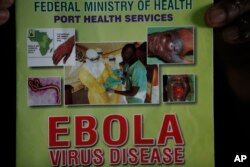As drug companies search for a cure to Ebola, Nigerian health officials warn that false, so-called "remedies" could help spread the disease, which has killed nearly 900 people this year in West Africa.
Bitter kola is a popular snack sold on the streets of Nigeria. It looks like a nut and is sometimes considered a traditional treatment for colds and coughs. You chew on it, and it’s high in anti-oxidants.
But it is not - absolutely not - a medicine to fight Ebola, says Nigerian Minister of Health Onyebuchi Chukwu.
“This bares repetition, and I want to repeat, that as I speak to you, there is no scientific evidence that the use of bitter kola will either cure or prevent the Ebola disease,” says Chukwu.
Bitter kola was once studied as a possible treatment for Ebola, he says, but the studies were inconclusive.
On the internet and in markets across Nigeria, people are searching for a cure for the disease. Some individuals are trying to make a profit. Others, like the increasing number of bitter kola chewers, are just trying to keep safe.
Officials have warned internet scammers, faith healers and traditional doctors that it is a crime in Nigeria to tell people you have a cure for Ebola.
Promoting false cures discourages the public to seek out expert advice and report symptoms, which is key to containing the disease, says the minister.
“Everyone, just like when you have a football team, will make suggestions and if we don’t streamline a lot of these suggestions the unwary public will become so vulnerable,” says the minister of health.
Late last month, a Liberian-American, Patrick Sawyer, died of Ebola after arriving in Lagos from Liberia. On Monday, officials said one of Sawyer’s doctors, a woman, was also infected and eight health workers are showing symptoms.
In a scramble to prevent Ebola from spreading, the Nigerian government is building isolation wards, screening travelers, and engaging in a massive public education campaign to encourage people to keep themselves clean
Ebola is contagious but spreads through contact with an infected person's bodily fluids, not casual touching or through the air.
Minister of Information Labaran Maku says besides false cures, false information that exaggerates the threat of Ebola can also harm Nigeria.
“We must not engage in things that will create panic or interrupt the free flow of people moving in and out of the country,” says Maku.
Maku says health workers are reaching out to mosques and churches, encouraging clerics to spread appropriate caution.
And as the Nigerian public waits for the test results from the eight currently-isolated health workers, he says, there is still hope that Nigeria may avoid a widespread outbreak.












